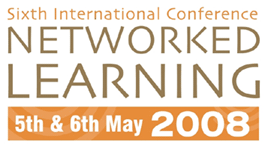

Activity Theory as a theoretical framework for the study of blended learning: a case study
Ilias Karasavvidis
Department of Preschool Education, University of Thessaly, ikaras@uth.gr
Abstract
Over the past decade we have witnessed the growing popularity of blended learning which provides opportunities to facilitate communication and collaboration, foster reflective thinking and promote discursive approaches to knowledge. However, the history of Educational Technology demonstrates that the opportunities afforded by technologies are not necessarily opportunities taken. E-learning does not appear to be an exception to this rule. Should the traditional pedagogical practices be adopted in e-learning then the conventional transmissionist practices are likely to replicated online, failing to support more active forms of learning. Novel pedagogical practices, activities, and tasks are required to make e-learning more effective. However, these novel approaches require a theoretical framework which will enable the systematic study of technological innovation. In this paper we employ Activity Theory (AT) as a theoretical tool for the study of blended learning. Activity Theory enables the study of tensions resulting from an innovation in an activity system such as a university course, allowing us to focus on what works and what does not work in an innovation.
The data reported in this paper are derived from an ongoing design research project which focuses on how a Learning Management System (LMS) can be best integrated into conventional tertiary education practices. More specifically, the present study aims to (a) describe the patterns of use of online resources by undergraduate students and (b) explain those patterns through the use of AT. 22 students who attended an elective undergraduate course on participated in the study. Moodle, a free and open source web application, was used as the LMS which hosted the course. Three types of online resources were included: (a) course materials (lecture notes, papers, web links), (b) course assignments (instructions, examples, sample scripts, videotutorials), and (c) forum (for course news, questions, discussions and other activities).
Data sources included surveys, group interviews, web server log files and field notes. Firstly, students completed an online questionnaire measuring their former ICT experience and attitudes towards ICT. Secondly, short semi-structured group interviews were conducted. Finally, the use of online resources was examined by looking at the log files which were recorded by Moodle. Information regarding the use of online resources was extracted from the server log files. This information was then combined with group interviews and other field notes to determine the students' perspective what on facilitated or hindered the use of the LMS.
The analysis of the log files indicated only 1266 resource related views by all students while about one fifth of the online resources provided were not viewed at all. The analysis clearly suggested a pattern of minimal use: even though ample opportunities were offered in terms of online resources students have not taken these opportunities to enhance their learning. The analysis of the interviews suggested that four major tensions emerged from blended learning: within the object, the mediational means, the rules, and the division of labor. The implications of these tensions for blended learning are discussed. It turned out that students made minimal use of the LMS, treating it mostly as an online repository of materials which were required for passing the course. This minimal use clearly suggests low blended learning utilization and an overall “course survival strategy”. The paper is concluded with a discussion of the contribution that Activity Theory made to understanding the patterns of use of online resources by the students.
| About NLC |
2008 Conference Papers
| Conference Committee| Keynote
Speakers
| Papers from previous NL conferences |Research Seminars| Current Conference
| Sponsors | Contact
|
